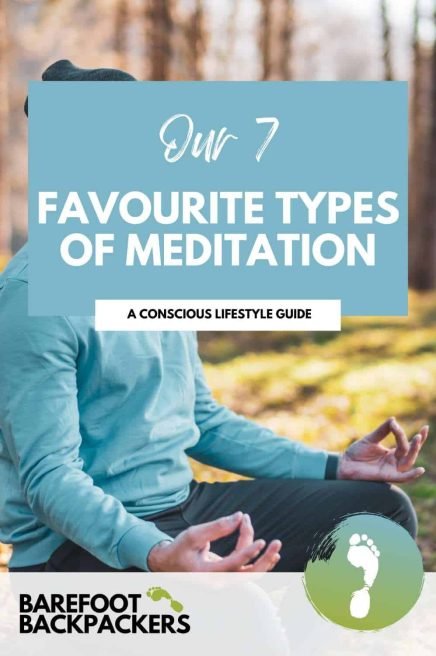In this Barefoot Backpackers guide we are going to explore the different types of meditation that can help calm the mind and help you deal with stress. First of all, everyone has heard of meditation, but what is it and where does it come from? Meditation is an ancient practice traced back to belief systems and cultures such as Buddhism, Hinduism, and Taoism. Even though this common practice back then, it can be argued that it is more important than ever in today’s fast-paced world . Meditation has a lot of benefits, from reducing stress and anxiety to calming the overactive mind. It is a tool that brings balance to the mind and body. Now, people now turn to meditation as a way to navigate the craziness of modern life. It is a vast subject which offers a variety of techniques. Here are our go to practises that are useful whether you’re a beginner or experienced.
Ask any spiritual teacher, medical professional, or mindset coach for their top piece of advice, and you’ll likely hear: meditate. The benefits of meditation are limitless, offering improved focus, reduced stress, better sleep, and improved emotional well-being. It really is more than just a relaxation tool – meditation connects us to the present moment and helps build resilience in the face of life’s challenges. It is integral to our nature yet so many of us find it challenging.
As one of humanity’s oldest practices, meditation has been used by monks striving for Nirvana and by everyday people seeking peace of mind. While achieving such spiritual heights may seem ambitious today, meditation remains a versatile and accessible tool for healing and growth. Whether through apps like Headspace, group sessions, or 10-day silent meditation courses like Vipassana, meditation offers a way to bring balance to the mind and body. All you need is a quiet space, and you can practise anywhere, anytime. It really is an incredibly vital resource at our finger tips! So let’s get into some of our favourite types of meditation

This blog is supported by the community. If you choose to purchase through our links, we may earn a small commission, which allows us to keep creating content. As an Amazon Associate, we earn from qualifying purchases. Learn more.
7 Types of Meditation
1. Spiritual Meditation
In traditions such as Buddhism, Hinduism, and Taoism, spiritual meditation focuses on connecting with something greater than ourselves. This can be the Divine, universal energy, or your higher-self. In non-theistic traditions, meditation can create a feeling of compassion and self-realisation, a time to reflect on our thoughts and actions. This type of practice is ideal for those seeking spiritual growth, and can be done in nature, at a place of worship, or in the comfort of your home.
2. Mindfulness Meditation
This one may be the most familiar to some. Derived from Buddhist teachings, mindfulness meditation trains the mind to stay present by focusing on the breath or bodily sensations. This technique is well known for its ability to reduce stress and improve emotional regulation. It’s a straightforward yet effective practice for those seeking to live more in the moment. Headspace is an excellent resource for starting out mindfulness meditation.

3. Movement Meditation
Perfect for those who find sitting completely still challenging, movement meditation combines physical activity with mindfulness. This can be practices like yoga, tai chi, or even walking allow the body and mind to synchronise. Whether you are dancing, gardening, stretching, or simply walking mindfully, this approach turns motion into meditation. It is a practice to keep you focused on the present moment and in tune with your body, rather than slipping away into thoughts.
4. Focused Meditation
This technique involves concentrating on your breath, a single object, a sound, or an activity, such as gazing at a candle flame or making a cup of coffee or tea. Focused meditation helps with concentration and can help you to not fall back into autopilot or get swept up in the distractions of modern life. Why do this? When committing fully to the present moment, you’ll rediscover the joy of singular focus, everything becomes more exciting and beautiful. The breath is an excellent place to start. By just focusing on your breath or the sensation of breathing from your nostrils this can tether you back to the present moment and calm the mind.

5. Visualisation Technique
This is a powerful method for manifestation and rewiring your brain. The method uses mental imagery to evoke specific feelings or qualities. You might imagine a tropical beach trip you have been desiring or visualise your goals being achieved. We love to use this powerful technique for personal transformation as visualisation meditation taps into the mind’s creative potential, offering both relaxation and motivation. You create your own reality and your imagination is a a very powerful tool.
6. Chanting Meditation
Practised in spiritual traditions worldwide, chanting meditation involves repeating mantras or sounds, such as “Om,” to focus the mind. Additionally, this technique creates a feeling of a peaceful, alert state and can deepen your connection to qualities like compassion and confidence. Chanting offers a rhythmic, grounding approach to meditation and also helps to stimulate your vagus nerve to regulate your nervous system.

7. Sound Healing Meditation
Another modern addition to meditation, sound healing uses instruments like singing bowls or gongs to create soothing vibrations. These sounds align with specific frequencies believed to promote relaxation and balance. Ideal for those who enjoy auditory experiences, this practice is a very rejuvenating meditation style. Meditating to binaural beats can help you fall asleep, calm the mind or focus on tasks at hand too.
FAQ: Types of Meditation
Is meditation scientifically proven to reduce stress?
Yes, meditation has been extensively studied for its ability to reduce stress. Techniques like mindfulness meditation lower cortisol levels, improve emotional regulation, and enhance overall well-being. Regular practice also builds resilience, helping you manage challenges with greater ease. In a study published in Frontiers called: “Mindfulness and Happiness: The Mediating Roles of Resilience and Stress.” they looked into the effects of mindfulness on happiness through both resilience and stress as mediators. The study found that mindfulness creates resilience, which in turn enhances happiness and reduces stress.
Can meditation improve sleep?
Absolutely. Techniques such as mindfulness and visualisation meditation are particularly effective for improving sleep quality. By calming the mind and reducing stress, meditation prepares your body for restful, uninterrupted sleep, making it a natural remedy for insomnia.
Do I need to meditate for long periods to see benefits?
Not at all! Even 5–10 minutes of daily meditation can yield noticeable benefits, such as improved focus and reduced anxiety. The key is consistency. Over time, you’ll find it easier to extend your practice.








